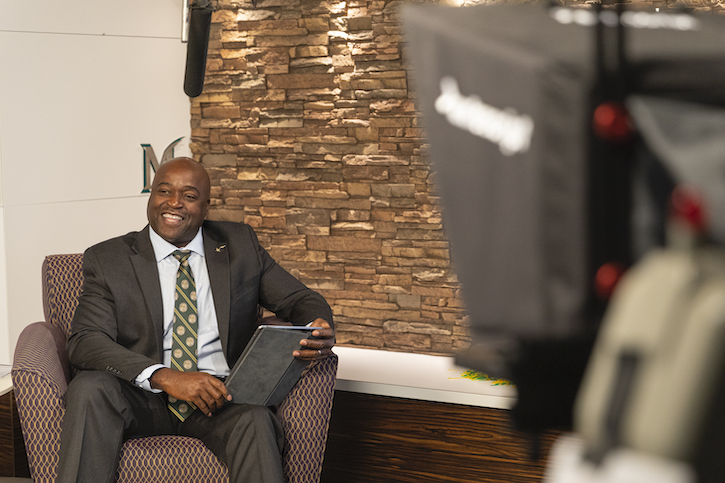
President Washington started his first day at GMU-TV studios ready to meet with students, faculty, staff and alumni virtually. Photo by Lathan Goumas.
Gregory Washington spent his first day as George Mason University’s eighth president meeting virtually with students, faculty, staff, and alumni live on GMU-TV, sharing with each group his ambitious vision for the university, at one point saying, “If you want to be a big institution, you’ve gotta be big in the big things.”
A few themes were prevalent throughout the four wide-ranging, hour-long discussions, including Mason’s potential as an even greater national model for inclusivity and excellence and the university’s ability to tackle the world’s “grand challenges.”
“The culture of creativity and collaboration and innovation is clearly here,” Washington said during his afternoon session with the Faculty Senate. “The programs and initiatives that have come out of this institution—online programs, how we handle transfer students, what we’ve managed to do on the research side—that’s a breadth that to be honest with you is not one that is seen at many universities across the country.”
Washington, former dean at the Henry Samueli School of Engineering at the University of California, Irvine and interim dean of engineering at Ohio State University, also spoke of the need to “re-educate a whole nation of people” who soon will lack the skills to flourish as workforce demands change.
Washington met first with student leaders because “you are the reason we’re here.” But that was not the only reason: “We left you with a doozy of a host of problems, and I need to get you to the point where you’re going to be leaders in solving them.”
Innovation was a recurring theme. Washington pointed out that he would have been laughed out of the room a year ago if he suggested that a major university move all its classes online within two weeks. This spring, that happened across the country because of COVID-19. That pivot opens the possibility for other innovations to better serve a student population with a wide arrange of backgrounds, including large transfer and commuter populations, he said.
“When we look into best practices nationally, we’ll be looking at our peers, but I would like for our peers to look toward us,” Washington said. “Those institutions who are willing to think out of the box, those institutions who are willing to be creative, those institutions who are willing to be innovative are going to be those institutions that lead us—and the rest of them—out of this. Mason has always been there in that regard, and this is an opportunity for the institution to leapfrog many others.”
In welcoming Washington, Faculty Senate chair Shannon Davis, who co-chaired Mason’s presidential search committee, noted that Washington as a first-generation graduate “embodies who Mason is and what our university does.” Washington, Mason’s first African American president, emphasized the role that faculty will play in determining the university’s direction.
“Faculty will have a greater seat at the table than they’ve ever had—but they will have greater responsibility than they’ve ever had,” Washington said. “And to me, those two pieces go together.”
In his evening session with the Alumni Association, Washington said, “the quality of the institution is measured by its graduates, not by its students” and encouraged broader support from Mason’s more than 200,000 alumni.
“Our support from alumni to our campus Foundation is among the lowest for a major public institution of our size,” he said. “We need more of you involved, we need more of you giving, we need more of you engaging. You can’t have a great institution without great alumni and community individuals supporting it…. It’s a symbiotic relationship.”
The sessions also took their playful turns. Washington, unleashing a warm cackle on occasion, lamented the Northern Virginia humidity, joked that he looks better in his mask, and queried Mason staff for TV series recommendations now that he’s burned through “Game of Thrones” and shifted to “Ozark.”
But in engaging the four groups, Washington was squarely focused on where he can lead the university and the role that all stakeholders can play in its success as Mason approaches its 50th year as an independent institution in 2022.
“This is a young institution,” Washington said to the Staff Senate. “Its history, its norms, its traditions are actually being written as we speak. We are by no means at the end of this. We are pretty much at the beginning.”
Recordings of the conversations are available at president.gmu.edu.
